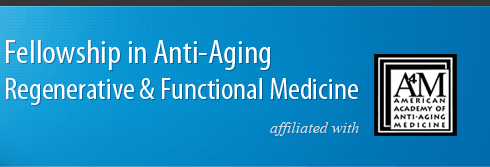Fellowship Modules Online
- Easy to use online video sessions
- Same experts as live modules
- Same material as live sessions
- Learn from your home or office
- Avoid travel expenses
- Save time and money
Module IV: A Metabolic and Anti Aging Approach to Amino Acid and Fatty Acid Metabolism Drug Induced Nutrient Depletion Stem Cells and Regenerative Medicine Spirituality and Osteoporosis
Upon completion of this module, the participants will:
- Know the role of nutrition in maintaining optimal health as the patient ages
- Learn phase I and phase II detoxification and the consequences of the body's inability to detoxify
- Learn nutritional depletions caused by medications
- Understand the relationships among the biotransformation enzyme systems
- Know the common warning signs indicating that toxicity may be a factor for the patient
- Understand the roles of physical, psychological, and spiritual health in Metabolic and Anti-Aging Medicine
- Know essential, conditionally essential, and non-essential amino acids and symptoms of amino acid deficiencies
- Learn new treatment plans for osteoporosis
- Look at pharmaceutical inhibitors of Phase 1 cytochrome P450 enzymes
- Learn treatment modalities for the dietary and nutritional support of detoxification
- Know the risk factors for osteoporosis
- Look at metallothioneins and genetic polymorphisms
- Know the function of fatty acids in the body
- Know treatments for amino acid deficiencies
- Learn disease process that have amino acid deficiencies as an antecedent
- Be aware of the diseases that can be treated with fatty acid replacement
- Understand that fatty acid intake can change the amount of medication that a patient may need
- Teach new pain control options used in Metabolic and Anti-Aging Medicine
- Understand fatty acids may have profound effects on the network of inflammatory mediators altering prostanoid synthesis, PPAR activity, and the response to cytokines
- Review the basic concepts behind the disciplines of metabolomics and nutrigenomics
- Define the critical steps involved in signal transduction and intracellular signaling, with emphasis on transmembrane receptors, intracellular kinases, transcription factors and DNA response elements
- Learn how DNA expression can be modified by specific dietary and lifestyle factors
- Identify the differences between types of stem cells
- Learn how stem cells are harvested for autologous use
- Learn about the current applications of stem cells from literature review
- Identify future applications for autologous stem cells
- Understanding of basic pathophysiology of thyroid metabolism as it relates to cardiac function
- Evaluate the current myths regarding thyroid replacement therapy
- Understanding of how thyroid deficiency can directly relate to cardiac disease, hypertension, hyperlipidemia, arrhythmia and heart failure
- Look at the role that genomics, pharmacogenomics, proteomics, and nutrigenomics has in Metabolic and Anti-Aging Medicine
- Look at a patient-centric system of health care that addressed biochemical individuality and genetic uniqueness to improve health and function of the patient
- Understand the relationships among the biotransformation enzyme systems
- Teach the participant the value of a preconception medical evaluation
- Learn what tests to order on a patient for a preconception medicine evaluation
- Aid the participant in the interpretation of labs results in a preconception medicine consult
- Learn the importance of EPA/DHA supplementation use in the mother and how it later affects the health of her child
- Study implementation modalities for patients with fatty acid deficiencies
- Learn the symptoms of toxic build up
- Discover how patients are exposed to toxins
- Realize what nutrients aid in phase I detoxification of the liver
- Understand that a toxic metabolite can build up between Phase I and Phase II detoxification that may be more toxic than the original metabolite
- Learn the six phases of Phase II detoxification
- Ascertain how to treat a patient with abnormal phase I or phase II detoxification
- Explain how amino acid insufficiencies can manifest among a population that over-consumers dietary protein
- Demonstrate expertise in strategies for planning corrective interventions with amino acids
- Explain how fatty acid insufficiencies can manifest among a population that over-consumers dietary fat
- Explain the types of toxicants and their respective levels of health threats
- Describe methods of assessment for xenotoxin exposures and endotoxin burdens
- Demonstrate expertise in strategies for planning corrective interventions to reduce toxin loads and improve detoxification function
- Attendees will achieve an expanded awareness of the common environmental toxins and their impact on the body; this awareness can then be used to help patients make informed decisions about healthy lifestyle choices
- Attendees will gain a working knowledge of the scientific evidence supporting the role of environmental and endogenous toxins in initiating and perpetuating chronic disease and accelerated aging; this information can then be used to enhance the practitioner's diagnostic skills in the recognition of toxin-related disease
- Attendees will gain an understanding of current knowledge regarding the biotransformation and elimination of environmental toxins and the scientific basis supporting the use of nutrients and plant-derived factors for enhancing these processes as a strategy for treating toxin-related disease and improving overall health; practitioners will be able to use this information to expand their therapeutic repertoire
- Review the basic concepts behind the disciplines of metabolomics and nutrigenomics
- Define the critical steps involved in signal transduction and intracellular signaling, with emphasis on transmembrane receptors, intracellular kinases, transcription factors and DNA response elements
- Learn how DNA expression can be modified by specific dietary and lifestyle factors
- Identify risks associated with non pharmaceutical grade fish oils
- Identify future applications for autologous stem cells
- Basic understanding of the pathophysiology of Vitamin D
- Knowledge of the implications of vitamin D deficiency
- Learn new lab normals for Vitamin D
- Explain the symptoms of the various headache types
- Identify non-pharmacological treatments for head pain
- Describe the mechanism of action of Butterburr in reducing the frequency of migraine
- Outline a treatment plan utilizing various treatment options for the migraine patient
- Review the pathophysiology of peripheral pain transmission and the various receptors involved
- Review the use of topical pain medications and the rationale for use
- Review various herbs and supplements that can help in the management of the chronic pain patient
- Know the mechanisms of how Vitamin K works in the body
- Learn the forms of Vitamin K
- Review the importance of Vitamin K in vascular health
- Know the causes of Vitamin K deficiency
- Understand the use of Vitamin K supplementation in patients taking Warfarin





